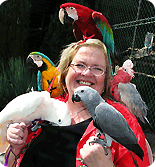Finding veterinary help

My 8 year old Senegal, Qt, and I live in the Santa Cruz mountain area of California. We had excellent care when we lived in Contra Costa County, but here, I have learned there is no emergency avian care. Qt has never been ill prior to now. Unfortunately, it’s the weekend and I’m terrified that I’m going to lose her. None of the vet hospitals with avian vets are open and none will contact the vet outside of normal business hours. I have called well over 10 offices and hospitals and have only found a regular DVM with an interest in exotic animals willing to see her (an 1 1/2 drive—proved worthless and $400). Her crop is so distended with gas and her droppings are scant to nothing. She is completely puffed up, half-lidded, and shaking—even in an 85 degree ‘hospital’ enclosure. I’m giving her warm Pedialyte and Diflucan. I’m massaging her crop every 30 minutes. The receptions I’ve been in contact with, to a person, have been insensitive and unresponsive. I want to know how an Avian vet (who knows that a visibly sick bird requires emergency care) can ethically leave their patients and community without emergency services or even a valid referral (most referred me to the same hospital that didn’t have an Avian vet). I don’t know what to do. I feel helpless and angry. I wish I had asked about supportive care after hours. It simply didn’t occur to me. I am praying, now, that she’ll survive until Monday…

Hi- There is nothing so frustrating and upsetting as having one of our avian companions seriously ill; I worry about my birds, too, when they are sick. Your feelings of anger and helplessness are justified in your concern about Qt. I have been practicing avian medicine for ten years (and small animal medicine for 35 years) and I find that avian DVM’s are few and far between. Therefore, I recommend that all parrot caregivers be prepared for when (not if) an emergency occurs. Many areas are totally without avian veterinary care; it is not unusual for clients to drive 2-3 hours to see a doctor. When getting a bird, it is good to become established with a qualified avian veterinarian and discuss after-hours procedures before they are needed.
Of course, hindsight is always 20/20. Qt’s symptoms could be caused by any number of diseases/problems. Whenever a bird is critically ill, the best treatment is to make sure they are hydrated (the Pedialyte is good, you might also try hand-feeding formula), warm (I would bump up the heat to 90 degrees and watch her for overheating: open-beak breathing, wings held away from body) and supplemental oxygen (difficult to do at home). I would not necessarily give the Diflucan unless Qt has had problems w/ yeast/fungal infections in the past. Another problem with birds is that they are masters at disguising illness and often do not show symptoms, even when seriously ill. I have had many experienced caregivers bring in their parrot in right away, after having noted them fluffed and not moving; upon examination/testing, it becomes apparent that the bird has been sick for days, weeks, even months. Often, the disease has progressed beyond the point of treatment. I hope this is not the case w/Qt!
Continue w/your supportive care for Qt. That is the best anyone can do; I will keep you in my prayers, too.

































